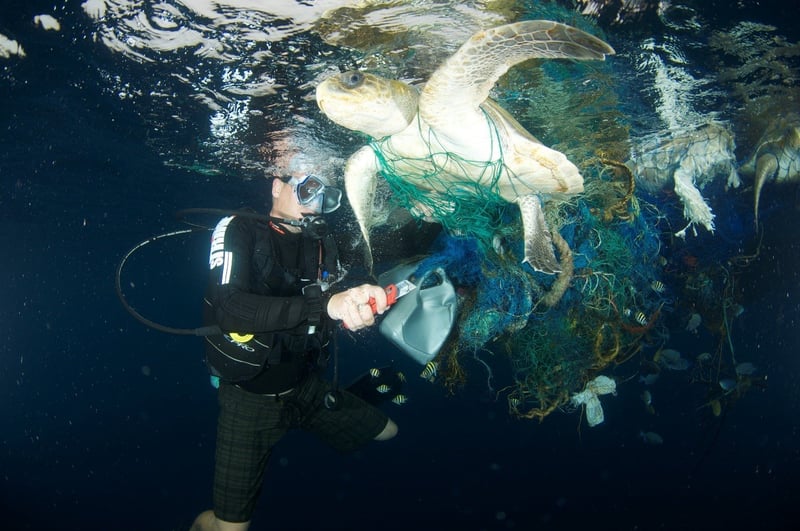
Saving sea animals from ghost gear in the Indian Ocean
News
In the Maldives, large numbers of Olive Ridley sea turtles are found entangled in ghost fishing gear. This phenomenon is heartbreaking and unusual – as there are no known nesting or foraging habitats for this species in the country
The turtles become trapped in the debilitating plastic nets, which are lost or abandoned by fishing boats in the Indian Ocean. Once entangled, they may drown within minutes or suffer long, painful deaths lasting months or even years.
But net fishing is banned in the Maldives. So where are the nets – and the turtles – coming from?
To understand and fight the Maldives’ ghost net problem, in 2013 two scientists began the Olive Ridley Project (ORP) – an initiative to remove and analyse ghost gear from the Indian Ocean and protect sea turtles and their habitats. To date, the ORP and its team of volunteers have removed over 1,200 ghost nets and rescued over 300 entangled turtles throughout the Indian Ocean.
 Image credit: Umair Bin Habib / Olive Ridley Project
Image credit: Umair Bin Habib / Olive Ridley Project
A quiet threat haunting our oceans
Ghost nets likely travel to the Maldives on strong oceanic currents from surrounding countries – and with them come Olive Ridleys and other sea animals they trap along the way.
In the small fishing community of Rehmangoth, Pakistan, the ORP is running a removal and education project supported by World Animal Protection and Ocean Conservancy through the Global Ghost Gear Initiative (GGGI). Moray eels, coral, sponges and sharks have been found trapped in over half a ton of ghost gear removed from local waters so far. The field team even disentangled a distressed dog – it’s not just sea animals at risk.
Education, removal, reuse
In Rehmangoth, field supervisor Asif Baloch has been educating the community on the dangers of discarding gear irresponsibly and the consequences of lost gear for fishers’ livelihoods. Further workshops are planned on preventing gear loss and damage.
A team of divers is working to remove ghost gear from local waters, especially around turtle nesting areas. Sadly, a single dive can yield large amounts of ghost gear – on a recent trip, for example, the team removed 52kg of ghost nets from a popular fishing ground.
But what to do with the ghost gear once it had been retrieved? With the help of textile expert Seher Mirza, the ORP has been holding workshops with local artisans to incorporate ghost gear into their designs. This partnership could eventually yield an alternative income for the women of Rehmangoth – with potential to be replicated in other coastal villages.
 Image credit: Sharmeen Khan / Olive Ridley Project
Image credit: Sharmeen Khan / Olive Ridley Project
Main image credit: Dave Bretherton / Olive Ridley Project
To date, the ORP and its team of volunteers have removed over 1,200 ghost nets and rescued over 300 entangled turtles throughout the Indian Ocean.
Our wildlife work
Around the world, wild animals are being exploited. They’re hunted down, trapped and farmed in captivity, all to be sold and abused for entertainment, medicine, fashion, pets and products.
Our work
We're working in Australia and around the world to end the needless suffering of animals by inspiring people to change animals’ lives for the better.

